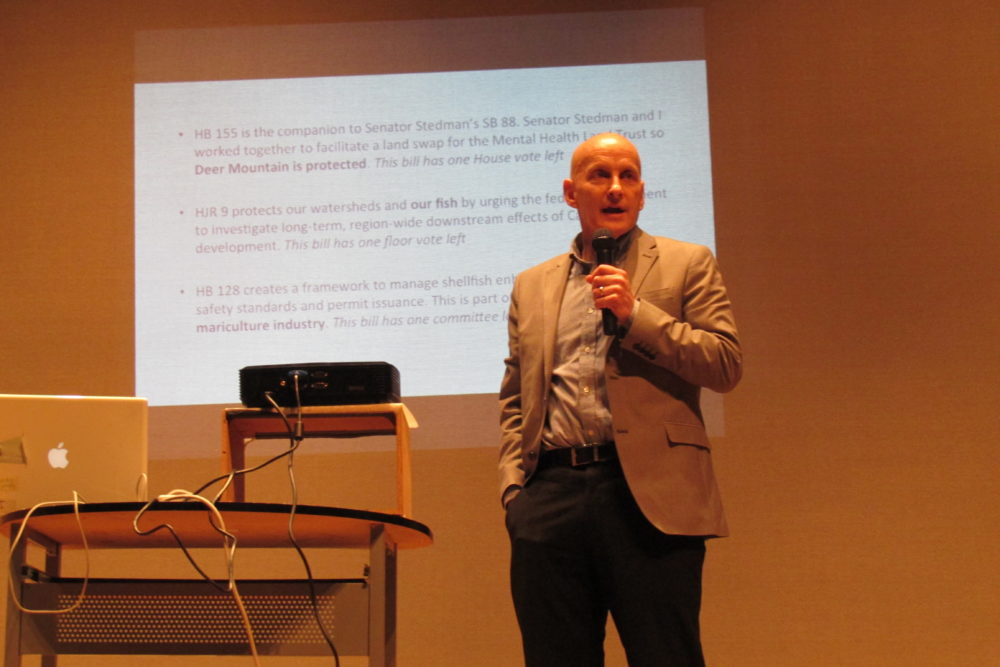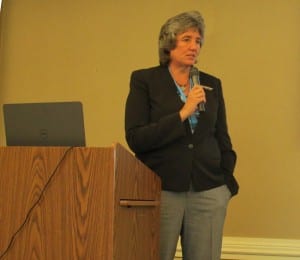
Representative Dan Ortizheld a town hall meeting in Ketchikan Thursday night. Ortiz shared the details of a fiscal plan to address declining State revenue, and gathered input from constituents.
After speaking about legislation he’s introduced or co-sponsored, Ortiz discussed the State budget crisis, and House and Senate proposals to address the fiscal gap. He was joined by Pat Pitney, budget director for the State of Alaska. Ortiz says the State can no longer rely on savings, and needs a buffer in case there is an emergency.
He explained the four components of the House’s plan – reducing this year’s budget by $82 million, reforming the current oil tax-credit system, restructuring how the Permanent Fund is managed, and establishing a broad-based tax that would generate at least $650 million annually once fully implemented.
To illustrate the extent of the State’s fiscal crisis, Pitney used the example of a person who was earning $80,000 a year now having to live on $16,000 annually. She says you can cut out non-essentials, tap into savings, and draw from your retirement account, but that is still not enough.

“Even after you do all those things, you still have a gap between the amount of money you’re earning now, $16,000 compared to what used to be $80,000, and your spending. Even when you’re drawing sustainably from your IRA, you still have that gap. That’s the state’s budget in your household terms.”
Pitney says State funding to Ketchikan municipalities totals about $31 million. This includes funding for schools, school debt, and public employee retirement.
After a one-hour presentation explaining the situation and proposals, Ortiz asked the audience to share questions or comments.
Under the House’s current plan, the proposed broad-based tax would be an income tax. A few people spoke in support of an income tax, one suggesting that it have a sunset clause. Several others spoke against an income tax, saying it taxes only one segment of the population, the working people.
Wayne Phillips says an income tax will also hurt retirees.
“One of the reasons I decided to stay here is because there was no income tax. Because what I have to look at is what my retirement is. And now you’re telling me that you’re going to tax my retirement. You’re going to tax where I work now as well. I’m just not a fan of it.”

Some oppose a sales tax, saying it would hurt those with lower incomes. Several people, however, spoke in support of a summer sales tax.
“We have a million people coming to just Southeast Alaska on cruise ships. They spend anywhere from $35 to several hundred dollars per person per town. A sales tax, if only implemented for the summer, would probably get you more than the income tax would.”
If there has to be a sales tax, a few people say necessities, such as food and rent, should not be taxed.
Rodney Dial does not support taxes, and feels more State cuts are needed. Dial was one of several people who questioned why organized boroughs and urban areas are required to pay taxes, while rural areas are not.
“Because more than half of the communities pay absolutely nothing, you’re now coming to us saying, ‘We’re going to have to take part of your dividend. We’re going to have to institute an income tax. So that the people who are paying taxes pay more, so that all these other communities can continue to pay none.”
A woman identifying herself as a paraprofessional in the school district feels there are areas in education funding that could be cut.

“They really are all given computers and iPods and everything under the sun, only for their grades to drop. I think there is a lot to be said for taking away a lot of those things. I think that it would save a lot of money, and their grades would probably go up.”
Other concerns expressed were funding for the Alaska Marine Highway, social services and Pioneer homes.
Ortiz says while sales and income taxes may not be popular, something has to be done.
“I will continue to push for a fiscal solution, and if that means I don’t get reelected, okay. But I just believe that that’s the right thing to do, so I’m going to be doing that.”
Ortiz says now the Senate and House proposals will go into conference committee where there will be discussions and compromise. He says he can’t guarantee the process will work but believes an agreement will be reached. Ortiz says if the final plan doesn’t add revenue, there will be additional cuts to education, health and human services programs and others.





